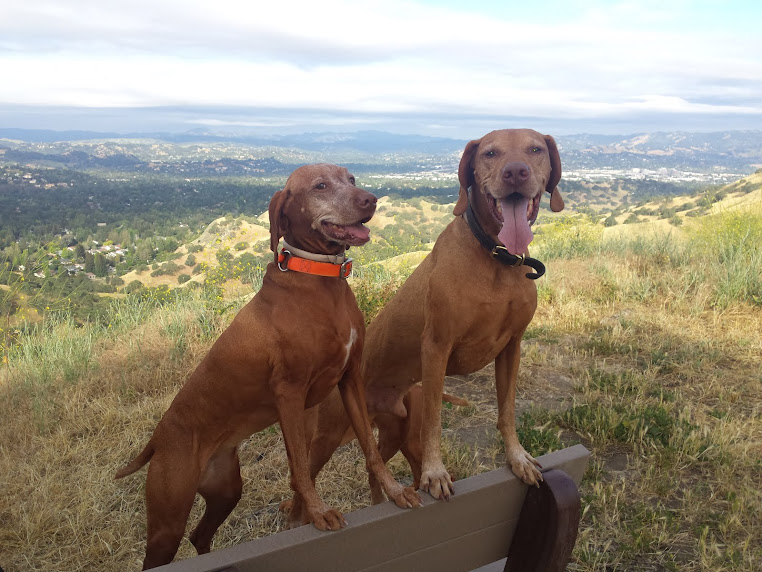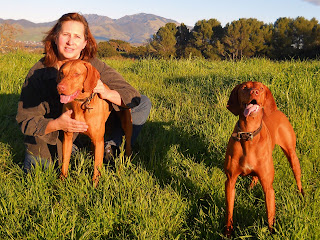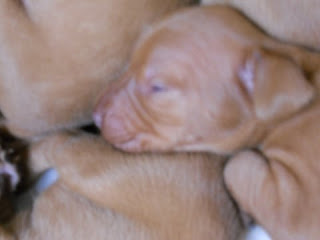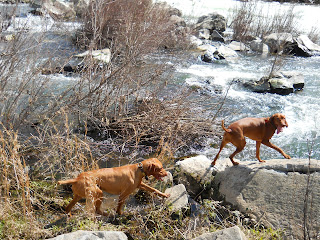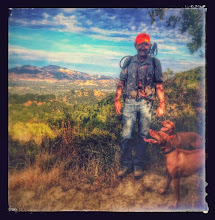Ted Kerasote's book, "Merle's Door" opened me up to how I'd want Chloe and Bailey to be raised.
As "Freethinking dogs."
Read how Ted and Merle met below. The story is a mixture of personal experiences, canine psychology and physiology.
Excerpt from Merle's Door. All rights reserved.
Chapter 1
From the Wild


He came out of the night, appearing suddenly in my headlights, a big, golden dog, panting, his front paws tapping the ground in an anxious little dance. Behind him, tall cottonwoods in their April bloom. Behind the grove, the San Juan River, moving quickly, dark and swollen with spring melt.
It was nearly midnight, and we were looking for a place to throw down our sleeping bags before starting our river trip in the morning. Next to me in the cab of the pickup sat Benj Sinclair, at his feet a midden of road-food wrappers smeared with the scent of corn dogs, onion rings, and burritos. Round-cheeked, Buddha-bellied, thirty-nine years old, Benj had spent his early years in the Peace Corps, in West Africa, and had developed a stomach that could digest anything. Behind him in the jump seat was Kim Reynolds, an Outward Bound instructor from Colorado known for her grace in a kayak and her long braid of brunette hair, which held the faint odor of a healthy, thirty-two-year-old woman who had sweated in the desert and hadn’t used deodorant. Like Benj and me, she had eaten a dinner of pizza in Moab, Utah, a hundred miles up the road where we’d met her. Like us, she gave off the scents of garlic, onions, tomato sauce, basil, oregano, and anchovies.
In the car that pulled up next to us were Pam Weiss and Bennett Austin. They had driven from Jackson Hole, Wyoming, to Moab in their own car, helped us rig the raft and shop for supplies, joined us for pizza, and, like us, wore neither perfume nor cologne. Pam was thirty-six, an Olympic ski racer, and Bennett, twenty-five, was trying to keep up with her. They had recently fallen in love and exuded a mixture of endorphins and pheromones.
People almost never describe other people in these terms—noting first their smells—for we’re primarily visual creatures and rely on our eyes for information. By contrast, the only really important sense-key for the big, golden dog, doing his little dance in the headlights, was our olfactory signatures, wafting to him as we opened the doors.
It was for this reason—smell—that I think he trotted directly to my door, leaned his head forward cautiously, and sniffed at my bare thigh. What mix of aromas went up his long snout at that very first moment of our meeting? What atavistic memories, what possibilities were triggered in his canine worldview as he untangled the mysteries of my sweat?
The big dog—now appearing reddish in the interior light of the truck and without a collar—took another reflective breath and studied me with excited consideration. Might it have been what I ate, and the subtle residue it left in my pores, that made him so interested in me? It was the only thing I could see (note my human use of “see” even while describing an olfactory phenomenon) that differentiated me from my friends. Like them, I skied, biked, and climbed, and was single. I had just turned forty-one, a compact man with chestnut hair and bright brown eyes. But when I ate meat, it was that of wild animals, not domestic ones—mostly elk and antelope along with the occasional grouse, duck, goose, and trout mixed in.
Was it their metabolized essence that intrigued him—some whiff of what our Paleolithic ancestors had shared? Smell is our oldest sense. It was the olfactory tissue at the top of our primeval nerve cords that evolved into our cerebral hemispheres, where thought is lodged. Perhaps the dog—a being who lived by his nose—knew a lot more about our connection than I could possibly imagine.
His deep brown eyes looked at me with luminous appreciation and said,
“You need a dog, and I’m it.”
Unsettled by his uncanny read of me—I had been looking for a dog for over a year—I gave him a cordial pat and replied,
“Good dog.”
His tail beat steadily, and he didn’t move, his eyes still saying, “You need a dog.”
As we got out of the cars and began to unpack our gear, I lost track of him. There was his head, now a tail, there a rufous flank moving among bare legs and sandals.
I threw my pad and bag down on the sand under a cottonwood, slipped into its silky warmth, turned over, and found him digging a nest by my side. Industriously, he scooped out the sand with his front paws, casting it between his hind legs before turning, turning, turning, and settling to face me. In the starlight, I could see one brow go up, the other down.
Of course, “brows” isn’t really the correct term, since dogs sweat only through their paws and have no need of brows to keep perspiration out of their eyes, as we do. Yet, certain breeds of dogs have darker hair over their eyes, what might be called “brow markings,” and he had them.

The Hidatsa, a Native American tribe of the northern Great Plains, believe that these sorts of dogs, whom they call “Four-Eyes,” are especially gentle and have magical powers. Stanley Coren, the astute canine psychologist from the University of British Columbia, has also noted that these “four-eyed” dogs obtained their reputation for psychic powers “because their expressions were easier to read than those of other dogs. The contrasting-colored spots make the movements of the muscles over the eye much more visible.”
In the starlight, the dog lying next to me raised one brow while lowering the other, implying curiosity mixed with concern over whether I’d let him stay.
“Night,” I said, giving him a pat. Then I closed my eyes.
When I opened them in the morning, he was still curled in his nest, looking directly at me.
“Hey,” I said.
Up went one brow, down went the other.
“I am yours,” his eyes said.
I let out a breath, unprepared for how his sweet, faintly hound-dog face—going from happiness to concern—left a cut under my heart. I had been looking at litters of Samoyeds, balls of white fur with bright black mischievous eyes. The perfect breed for a winter person like myself, I thought. But I couldn’t quite make myself bring one home. I had also seriously considered Labrador Retrievers, taken by their exuberant personalities and knowing that such a robust, energetic dog could easily share my life in the outdoors as well as be the bird dog I believed I wanted. But no Lab pup had given me that undeniable heart tug that said,
“We are a team.”
The right brow of the dog lying by me went down as he held my eye. His left brow went up, implying,
“You delayed with good reason.”
“Maybe,” I said, feeling my desire for a pedigree dog giving way.
“Maybe,” I said once more to the dog whose eyes coasted across mine, returned, and lingered. He did have the looks of a reddish yellow Lab, I thought, at least from certain angles.
At the sound of my voice, he levered his head under my arm and brought his nose close to mine. Surprisingly, he didn’t try to lick me in that effusive gesture that many dogs use with someone they perceive as dominant to them, whether it be a person or another dog—a relic, some believe, of young wolves soliciting food from their parents and other adult wolves. The adults, not having hands to carry provisions, bring back meat in their stomachs. The pups lick their mouths, and the adults regurgitate the partly digested meat. Pups who eventually become alphas abandon subordinate licking. Lower-ranking wolves continue to display the behavior to higher-ranking wolves, as do a great many domestic dogs to people. This dog’s self-possession gave me pause. Was he not licking me because he considered us peers? Or did my body language—both of us being at the same level—allow him to feel somewhat of an equal? He circumspectly smelled my breath, and I, in turn, smelled his. His smelled sweet.
Whatever he smelled on mine, he liked it.
“I am yours,” his eyes said again.
Disconcerted by his certainty about me, I got up and moved off. I didn’t want to abandon my plans for finding a pup who was only six to eight weeks old and whom I could shape to my liking. The dog read my energy and didn’t follow me. Instead, he went to the others, greeting them with a wagging tail and wide laughs of his toothy mouth. “...
http://www.kerasote.com/Merle.html
